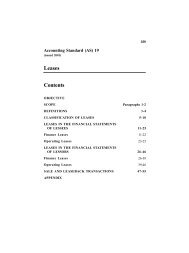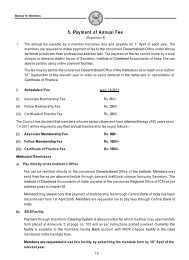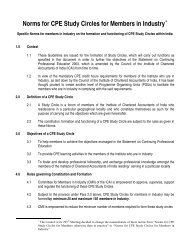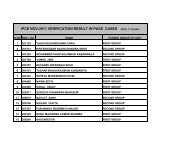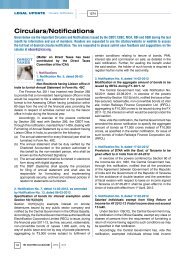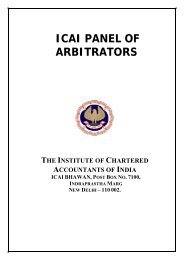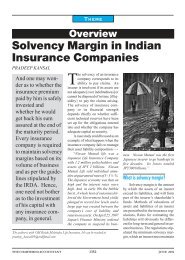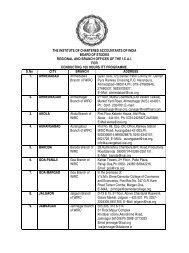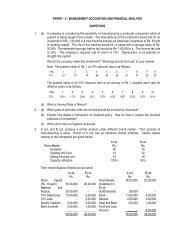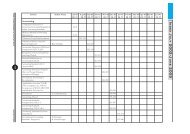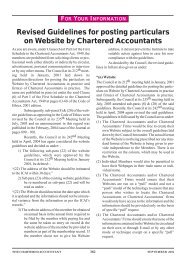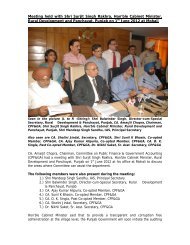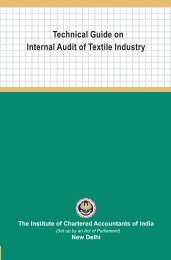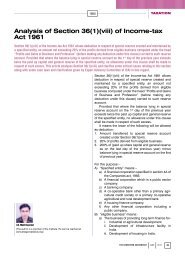The Chartered Accountant
The Chartered Accountant
The Chartered Accountant
You also want an ePaper? Increase the reach of your titles
YUMPU automatically turns print PDFs into web optimized ePapers that Google loves.
(This Accounting Standard includes<br />
paragraphs set in bold italic type and<br />
plain type, which have equal authority.<br />
Paragraphs in bold italic type indicate<br />
the main principles. This Accounting<br />
Standard should be read in the context<br />
of its objective and the Preface<br />
to the Accounting Standards for Local<br />
Bodies 1 )<br />
<strong>The</strong> Accounting Standard for Local<br />
Bodies (ASLB) 3, ‘Revenue from<br />
Exchange Transactions’, issued by the<br />
Council of the Institute of <strong>Chartered</strong><br />
<strong>Accountant</strong>s of India, will be recommendatory<br />
in nature in the initial years<br />
for use by the local bodies. This Standard<br />
will be mandatory for Local Bodies<br />
in a State from the date specified in<br />
this regard by the State Government<br />
concerned2 .<br />
<strong>The</strong> following is the text of the Accounting<br />
Standard for Local Bodies.<br />
Objective<br />
This Standard uses the term “revenue”,<br />
which encompasses both revenues<br />
and gains, in place of the term<br />
“income”. Certain specific items to be<br />
recognised as revenues are addressed<br />
in other Standards and are excluded<br />
from the scope of this Standard. For<br />
example, gains arising on the sale of<br />
property, plant and equipment will be<br />
specifically addressed in the Standard<br />
on property, plant and equipment3 and are not covered in this Standard.<br />
Guidance on accounting for fixed assets<br />
can be found in Accounting Standard<br />
(AS) 10, Accounting for Fixed<br />
Assets, until the ASLB on this subject<br />
is formulated.<br />
<strong>The</strong> objective of this Standard is to<br />
prescribe the accounting treatment<br />
of revenue arising from exchange<br />
DECEMBER 2008 1072 THE CHARTERED ACCOUNTANT<br />
STANDARDS<br />
Accounting Standard for Local Bodies (ASLB) 3<br />
Revenue from Exchange Transactions<br />
transactions and events. <strong>The</strong> primary<br />
issue in accounting for revenue is determining<br />
when to recognise revenue.<br />
Revenue is recognised when it is probable<br />
that future economic benefits or<br />
service potential will flow to the entity<br />
and these benefits can be measured<br />
reliably. This Standard identifies the<br />
circumstances in which these criteria<br />
will be met and, therefore, revenue<br />
will be recognised. It also provides<br />
practical guidance on the application<br />
of these criteria.<br />
Scope<br />
1. This Standard applies to the<br />
entities described as Local Bodies<br />
in the Preface to the Accounting<br />
Standards for Local Bodies4 .<br />
2. An entity which prepares and<br />
presents financial statements under<br />
the accrual basis of accounting<br />
should apply this Standard in<br />
accounting for revenue arising<br />
from the following exchange transactions<br />
and events:<br />
(a) <strong>The</strong> rendering of services<br />
yielding revenue;<br />
(b) <strong>The</strong> sale of goods; and<br />
(c) <strong>The</strong> use by others of entity<br />
assets yielding interest, royalties<br />
and dividends.<br />
3. This Standard does not deal with<br />
revenue arising from non-exchange<br />
transactions. Revenue arising from<br />
non-exchange transactions will be<br />
dealt with in the proposed Standard<br />
on ‘Revenue arising from Non-exchange<br />
Transactions’ 5 . Examples of<br />
non-exchange transactions include<br />
revenue from the use of statutory<br />
powers (for example, taxes, duties,<br />
and fines), grants and donations.<br />
4. Local Bodies may derive revenues<br />
from exchange or non-exchange<br />
transactions. An exchange transaction<br />
is one in which the entity transfers<br />
goods or services, or use of assets,<br />
and receives some value (primarily in<br />
the form of cash, goods, services or<br />
has liabilities extinguished) from the<br />
other party in exchange. Examples of<br />
exchange transactions include:<br />
(a) <strong>The</strong> purchase or sale of goods<br />
or services; or<br />
(b) <strong>The</strong> lease of property, plant<br />
and equipment<br />
5. <strong>The</strong> rendering of services typically<br />
involves the performance by the entity<br />
of an agreed task over an agreed<br />
period of time. <strong>The</strong> services may be<br />
rendered within a single period or<br />
over more than one period. Examples<br />
of services rendered by local bodies<br />
for which revenue is typically received<br />
in exchange may include the provision<br />
of housing and shopping complexes,<br />
management of water facilities, management<br />
of toll roads, and management<br />
of transfer payments. Some<br />
agreements for rendering of services<br />
are directly related to the construction<br />
contracts. Revenue arising from construction<br />
contracts will be dealt with<br />
in the proposed ASLB, ‘Construction<br />
Contracts’ 6 . Guidance on accounting<br />
for revenue arising from construction<br />
contracts can be found in Accounting<br />
Standard (AS) 7, ‘Construction Contracts’<br />
until the ASLB on this subject<br />
is formulated.<br />
6 Goods includes goods produced<br />
by the entity for the purpose of sale,<br />
such as publications, and goods purchased<br />
for resale, such as merchandise<br />
or building and other property held<br />
for resale.<br />
7. <strong>The</strong> use by others of entity assets<br />
1Attention is specifically drawn to paragraph 4.2 of the ‘Preface to the Accounting Standards for Local Bodies’, according to which Accounting Standards are intended to<br />
apply only to items which are material.<br />
2Reference may be made to the paragraph 7.1 of the ‘Preface to the Accounting Standards for Local Bodies’ providing the discussion on the compliance with the Account<br />
ing Standards for Local Bodies.<br />
3<strong>The</strong> proposed ASLB on ‘Property, Plant and Equipment’ is under preparation.<br />
4Refer paragraph 1.3 of the ‘Preface to the Accounting Standards for Local Bodies’.<br />
5<strong>The</strong> proposed ASLB on ‘Revenue from Non-exchange Transactions’ is under preparation.<br />
6<strong>The</strong> proposed ASLB on ‘Construction Contracts’ is under preparation.



